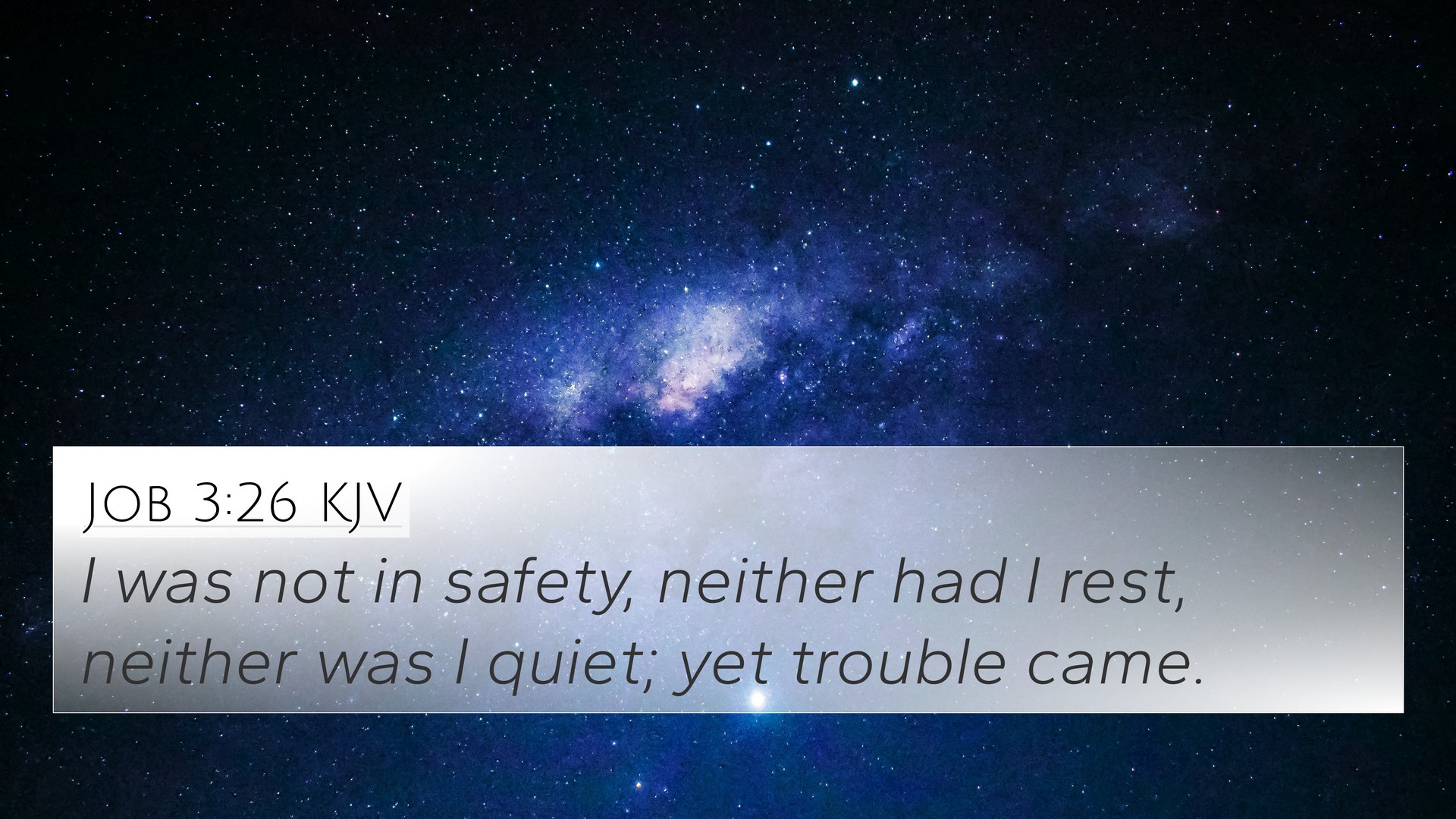Old Testament
Genesis Exodus Leviticus Numbers Deuteronomy Joshua Judges Ruth 1 Samuel 2 Samuel 1 Kings 2 Kings 1 Chronicles 2 Chronicles Ezra Nehemiah Esther Job Psalms Proverbs Ecclesiastes Song of Solomon Isaiah Jeremiah Lamentations Ezekiel Daniel Hosea Joel Amos Obadiah Jonah Micah Nahum Habakkuk Zephaniah Haggai Zechariah MalachiJob 3:26 Similar Verses
Job 3:26 Cross References
I was not in safety, neither had I rest, neither was I quiet; yet trouble came.
Uncover the Rich Themes and Topics of This Bible Verse
Listed below are the Bible themes associated with Job 3:26. We invite you to explore each theme to gain deeper insights into the Scriptures.
Job 3:26 Cross Reference Verses
This section features a detailed cross-reference designed to enrich your understanding of the Scriptures. Below, you will find carefully selected verses that echo the themes and teachings related to Job 3:26 KJV. Click on any image to explore detailed analyses of related Bible verses and uncover deeper theological insights.

Psalms 143:11 (KJV) »
Quicken me, O LORD, for thy name's sake: for thy righteousness' sake bring my soul out of trouble.
Job 3:26 Verse Analysis and Similar Verses
Understanding Job 3:26
The verse Job 3:26 states:
"I was not in safety, neither had I rest, neither was I quiet; yet trouble came."
Summary of the Verse's Meaning
In Job 3:26, Job expresses his despair after experiencing immense suffering. This verse captures the essence of human vulnerability and the inevitable approach of trouble, even in times when one seeks peace or safety. Scholars like Matthew Henry, Albert Barnes, and Adam Clarke provide significant insights into the emotional and theological implications of Job's lament.
Matthew Henry's Commentary
Matthew Henry elaborates on how Job, despite lacking peace, finds himself suddenly engulfed by afflictions. He examines the impact of suffering on faith and how even the most devoted individuals can experience profound distress. Job's words reflect a universal truth about human existence: the unpredictability of life's challenges.
Albert Barnes' Commentary
Albert Barnes highlights the depth of Job's anguish by noting that one can be constantly on guard for trouble and yet find it unavoidable. Barnes emphasizes that Job's words may suggest a connection to the human condition—showing how life's hardships can visit anyone, regardless of their circumstances or efforts to find solace.
Adam Clarke's Commentary
Adam Clarke focuses on the phrase "I was not in safety" and explores Job's internal turmoil, emphasizing that spiritual and emotional peace is sometimes elusive. Clarke notes that Job's lament serves as a poignant reminder of the complexities of faith amid suffering and can evoke sympathy from those who read his plight.
Key Themes in Job 3:26
- Suffering and Humanity: The verse encapsulates the struggle against unforeseen circumstances that lead to suffering, a theme prevalent throughout the Book of Job.
- Desire for Peace: Job's expression of being without rest signifies the human longing for peace in tumultuous times.
- The Nature of Trouble: The inevitability of trouble, regardless of one's state of mind or efforts to avoid it, is a core message of this verse.
Cross-References to Job 3:26
- Psalm 55:4-5: "My heart is sore pained within me: and the terrors of death are fallen upon me." This reflects the anguish and fear similar to what Job expresses.
- Isaiah 57:20-21: "But the wicked are like the troubled sea, when it cannot rest." This illustrates the lack of peace in the face of turmoil.
- James 1:2-3: "Count it all joy when ye fall into divers temptations." This emphasizes facing trials as part of the human experience.
- 2 Corinthians 1:8-9: "For we would not, brethren, have you ignorant of our trouble... that we were pressed out of measure." This aligns with Job's intense suffering.
- Revelation 21:4: "And God shall wipe away all tears from their eyes; and there shall be no more death, neither sorrow, nor crying." A promise of future peace contrasts Job's current despair.
- Proverbs 12:25: "Heaviness in the heart of man maketh it stoop: but a good word maketh it glad." This reflects the impact of emotional burdens, akin to Job's lament.
- Matthew 11:28: "Come unto me, all ye that labour and are heavy laden, and I will give you rest." A call for peace and relief from burdens, similar to Job’s yearning.
- Romans 8:18: "For I reckon that the sufferings of this present time are not worthy to be compared with the glory which shall be revealed in us." Reinforces the theme of suffering vs. eventual hope.
- Ecclesiastes 4:1: "So I returned, and considered all the oppressions that are done under the sun..." Highlights the prevalent suffering and lack of justice observed, resonating with Job’s experience.
Comparative Biblical Insights
Job 3:26 stands as a significant verse in illustrating the broader Biblical themes of suffering, emotional distress, and the search for peace amidst chaos. By cross-referencing scripture such as Psalm 55 and 2 Corinthians, we observe the consistency of these messages throughout the Bible.
Tools for Bible Cross-Referencing
Utilizing various tools can enhance the study of Job 3:26:
- Bible Concordance: It provides a way to find all occurrences of specific words or themes related to Job 3:26 and enrich understanding.
- Bible Cross-Reference Guide: Essential for linking concepts and finding parallels that deepen interpretation.
- Cross-Reference Bible Study: Involves examining related passages that speak to or enhance the understanding of Job’s lament.
- Comprehensive Bible Cross-Reference Materials: These are useful in conducting extensive studies on interconnected verses across both Testaments.
- Bible Chain References: Creating a chain of related verses (both Old and New Testament) can illustrate the continuity of God’s message regarding human suffering and divine providence.
Conclusion
Job 3:26 serves as a profound reminder of the struggles faced by those who seek peace in times of overwhelming trouble. The combination of insights from esteemed commentators, alongside relevant cross-references, illustrates the interconnectedness of faith, suffering, and the human experience within the Biblical text. Engaging with these themes through cross-referencing can significantly enrich one's understanding of both Job's experience and the broader narrative of scripture.




